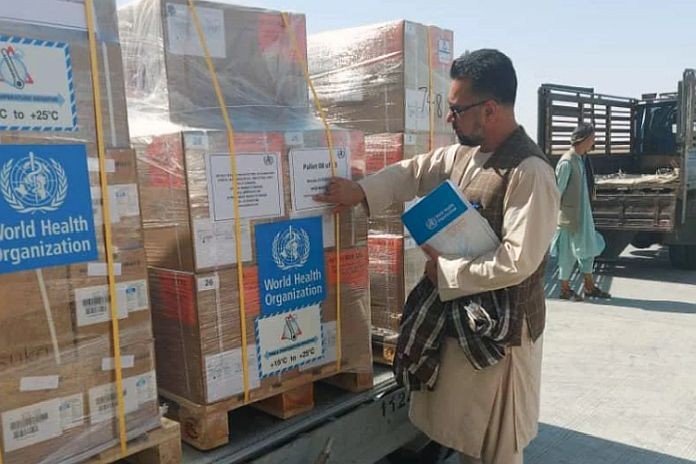KABUL / CAIRO – A plane carrying World Health Organization (WHO) medicines and health supplies landed in Afghanistan today, 30 August, at 12:25 pm local time.
This is the first shipment of medical supplies to land in Afghanistan since the country came under control of the Taliban authorities.
“After days of non-stop work to find a solution, I am very pleased to say that we have now been able to partially replenish stocks of health facilities in Afghanistan and ensure that – for now – WHO-supported health services can continue,” said Dr Ahmed Al Mandhari, WHO Regional Director for the Eastern Mediterranean.
The 12.5 metric tonnes supplies delivered consist of trauma kits and interagency emergency health kits, and are enough to cover the basic health needs of more than 200 000 people, as well as provide 3500 surgical procedures and treat 6500 trauma patients.
They will be immediately delivered to 40 health facilities in 29 provinces across Afghanistan.
The plane, which was provided by the government of Pakistan, was loaded with the supplies earlier today by WHO’s logistics team at the International Humanitarian City in Dubai, United Arab Emirates, and flown directly to Mazar-i-Sharif airport in Afghanistan.
This is the first of three flights planned with Pakistan International Airlines (PIA) to fill urgent shortages in medicines and medical supplies in Afghanistan.
“I would like to thank the government of Pakistan and PIA for their efforts to support WHO and the people of Afghanistan. Humanitarian agencies such as WHO have faced enormous challenges in sending life-saving supplies to Afghanistan in recent weeks due to security and logistics constraints. The support of the Pakistani people has been timely and life-saving,” added Dr Al-Mandhari.
WHO is working with partners to ensure that this week’s shipment is the first of many to follow. A reliable humanitarian air bridge is urgently required to scale up the collective humanitarian effort.
The world’s attention over the past two weeks has been focused on the air evacuation from Kabul airport. But the demanding humanitarian work of meeting the needs of tens of millions of vulnerable Afghans who remain in the country is now beginning; the world cannot now divert its attention from the people of Afghanistan at this critical time.





